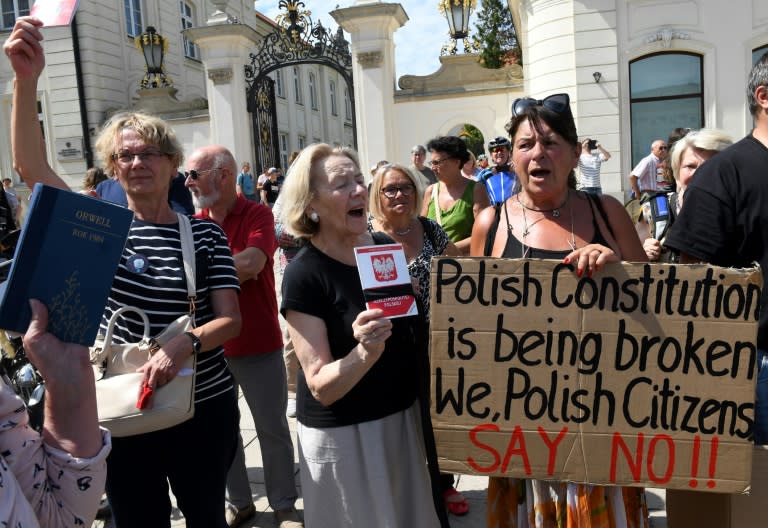Andrzej Duda: Polish president who risked saying 'no'
Polish President Andrzej Duda is an ally of the governing conservatives who had rubber-stamped everything they sent his way -- until he took the risk of vetoing their controversial judicial reforms. Duda, a 45-year-old lawyer elected head of state for a five-year term in 2015, said "no" after the governing Law and Justice (PiS) party's proposals sparked massive street protests, concern from the opposition and threats of unprecedented EU sanctions. By previously waving through government policies, Duda had earned the reputation of being the "pen" of PiS leader Jaroslaw Kaczynski, the country's most powerful politician. So it came as a surprise when Duda vetoed two judicial reforms -- on the Supreme Court and the National Council of the Judiciary -- which he said gave too much power to the attorney general, who in Poland is also the justice minister. Though he approved a third that allows the justice minister to unilaterally replace the chief justices of the common courts, which include appeal courts. The veto left the PiS stunned. Top party members openly disapproved of Duda's first act of independence in two years, the first time he had broken from the party that had seen him elected. According to diplomat and economist Andrzej Byrt, the vetoes were more than just a lawyer's concern over legislation that critics called deadly for judicial independence. Byrt told AFP that a personal incentive may have been at play as well, as Duda saw his powers being curtailed despite his colleagues' promises to the contrary. "The president felt himself being led down the garden path, because his powers to nominate judges would have been limited," Byrt said. Not to mention that the current attorney general, Zbigniew Ziobro, is a one-time ally who denounced Duda as "a traitor" and "Judas" during a spat in 2014. - Spiritual heir - Born in 1972 to a family of professors in the southern city of Krakow, Duda was a choir boy and Boy Scout before earning a law degree from the Jagiellonian University in 1996. When PiS first came into power in 2005, Duda was named deputy justice minister, a job he gave up in 2008 to become an aide to then president Lech Kaczynski, twin brother of current party leader Jaroslaw Kaczynski. A devout Catholic, Duda was close to Lech -- who in 2010 died when his presidential jet crashed in Smolensk, Russia -- and often calls himself his "spiritual heir". Duda was elected to the Polish parliament in 2011, then to the European Parliament in 2014. But he only became well-known after Kaczynski crowned him presidential candidate. "He's a distinguished politician, often denigrated but able to recover every time. There are few politicians in Poland who are as strong and determined as him," Duda had said about Jaroslaw Kaczynski at the time. Though he never denied his ties to the PiS leader, Duda also made a point of emphasising his independence while on the campaign trail. He quit the PiS in order to "serve the entire society" after defeating outgoing president Bronislaw Komorowski, a centrist who had widely been expected to win a second term. Like Poland's powerful Catholic Church, Duda opposes in-vitro fertilisation and the 2011 Istanbul Convention, the world's first binding legal instrument to prevent and combat violence against women, which Poland ratified in 2015. Duda had promised voters social benefits galore in fiery campaign speeches, including introducing extra tax exemptions for large families and lowering the retirement age to 65, a campaign promise he kept. In terms of foreign policy, Duda has worked on strengthening ties with NATO. Since he became head of state, the Western defence alliance and the United States have deployed their troops in the region in response to Russia's activity in neighbouring Ukraine. Duda's critics fault him for his role in bringing to heel his nation's Constitutional Court, which first led the European Commission to threaten to halt Poland's voting rights in the bloc further down the line -- a so-called "nuclear option" that the EU has never invoked. An avid skier, Duda is married to teacher Agata and has one daughter. His father-in-law is the Polish writer, poet and literary critic Julian Kornhauser.



